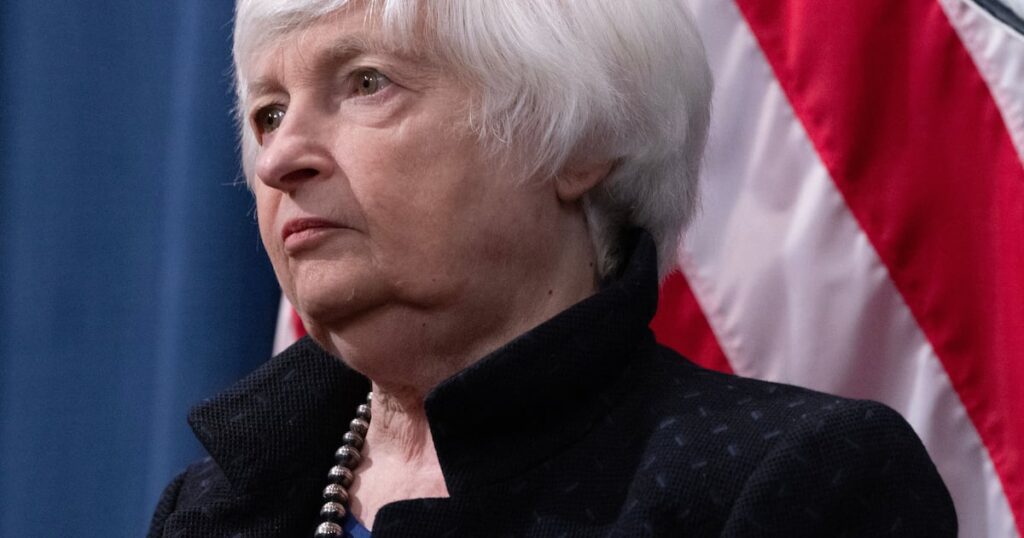- New Treasury regulations mandate customer background checks for DeFi front-ends.
- Regulations spare protocols, but industry says they still threaten US DeFi.
US websites and crypto wallets that provide easy access to the world of decentralized finance must conduct background checks on customers and record their every transaction starting in 2027, the Treasury Department said on Friday.
Crypto developers and advocates have long warned that the rules could pose an existential threat to decentralized finance, the blockchain-based financial software designed to cut out middlemen such as banks.
As of Friday, more than $179 billion in crypto had been deposited across the thousands of DeFi protocols tracked by DefiLlama.
The vast majority of these cryptocurrencies were deposited through user-friendly websites and apps, or front-end services, which allow people with little technical expertise to use DeFi protocols.
According to the new regulations, front-end services and wallets that allow users to trade cryptocurrencies are brokers. As such, they will need to begin collecting large amounts of customer data in 2027 in the name of preventing tax evasion and to help customers file their taxes to the Internal Revenue Service.
The rules are less burdensome than many feared: standalone crypto wallets without exchange functionality and DeFi protocols themselves appear to have been spared the broker designation. But the industry is committed to fighting them.
“The current regulation of brokers by the IRS and Treasury – days before the end of the year – is a disappointing, but expected, final attempt to send the US crypto industry overseas,” a said Kristin Smith, CEO of crypto lobbying firm The Blockchain Association. a declaration.
“Kill the dream”
In June, the Treasury Department finalized rules requiring certain crypto businesses to provide their customers with annual forms detailing each sale or exchange of their assets.
Join the community to receive our latest stories and updates
These rules will apply to centralized companies such as Coinbase and are intended to limit tax evasion and help US users file their taxes.
But the Treasury Department delayed rules that would have applied the same requirement to decentralized businesses like DeFi protocols after being inundated with more than 44,000 comments, many of which discussed the proposed regulations.
As initially proposed, the regulations would have required DeFi protocols and applications, their developers, self-hosted crypto wallets, and individuals holding governance tokens to verify the real identity of each user in order to generate the required tax forms. , venture capital firm Andreessen Horowitz wrote last year in a letter to the Treasury Department.
Industry lawyers, software developers and investors were apoplectic: the rules undermined the very purpose of blockchain technology, designed to enable peer-to-peer transactions, cutting out middlemen typically responsible for verifying users’ identities and monitor their behavior.
Who is a broker?
Jason Schwartz, a tax partner at Fried Frank and co-head of the firm’s crypto practice, said it was clear the Treasury Department did its homework before issuing the new regulations.
“They really tried to figure this stuff out,” he told DL News.
Still, the regulations could force many front-end service providers in the United States to close their doors or relocate, he said.
“It’s only more limited compared to what I think is an extremely aggressive and overbroad rule in their (first) proposal.”
According to the regulations, any person or service that “performs” a crypto transaction is a broker.
“Similar to the services provided by stock brokers in the securities industry, a trading front-end service provider receives a client’s trade order, verifies the order details and obtains the customer confirmation,” according to the Treasury Department.
Industry advocates say the analogy is flawed.
Front-ends don’t perform transactions — they “simply (help) someone else do it themselves,” wrote Peter Van Valkenburgh, research director at crypto think tank Coin Center, in an analysis of the rule.
Next steps
Tax reporting requirements are insignificant for multinational banks, but they could be fatal for front-end service providers, which operate on relatively thin margins, according to Schwartz.
Still, he is “cautiously optimistic that these regulations will never go into effect,” he said.
According to Coin Center, there are at least two ways to remove the new rules.
First, cryptocurrency developers can file a lawsuit, arguing that the Treasury Department has exceeded the powers granted to it by Congress. Second, a crypto-friendly Congress can repeal the regulations itself.
Indeed, Representative French Hill, Republican of Arkansas and new chairman of the Financial Services Committee of the House of Representatives, has already criticized them.
“This rule is Treasury overreach, a blatant and ill-conceived attempt to target DeFi, and should never have been finalized in the final days of the Biden-Harris administration,” he said.
Aleks Gilbert is DL News‘ DeFi correspondent based in New York. You can contact him at aleks@dlnews.com.




